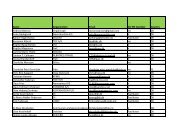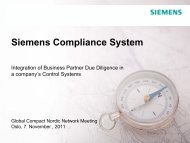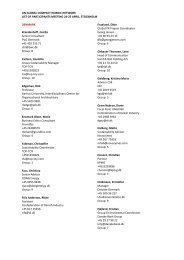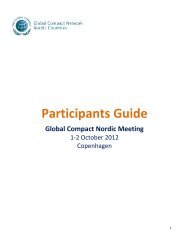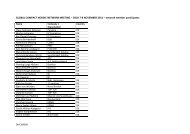Business Against Corruption - A Framework for Action - International ...
Business Against Corruption - A Framework for Action - International ...
Business Against Corruption - A Framework for Action - International ...
- No tags were found...
Create successful ePaper yourself
Turn your PDF publications into a flip-book with our unique Google optimized e-Paper software.
15Collective actionOften a local business leader takes the viewthat, although it would be desirable toexclude all <strong>for</strong>ms of corruption, he or shecannot do it alone. There is at times a perceptionthat corruption—from petty bribery andso-called facilitation payments to large-scalecorrupt acts—is so much part of local culturethat there is no remedy <strong>for</strong> the individualcompany. Although business managers mayrecognize that corruption is a problem, theymay not consider it their role to change thebusiness culture.In these circumstances, collective actionwith other companies provides one of thekey solutions. “Collective <strong>Action</strong>” is a processof cooperation between various stakeholderswith the aim to jointly counter corruption.Through such alliance of like-minded organizationsthe problem can be approached andresolved from multiple angles, and the impactof individual action can be increased. Theultimate aim of these joint ef<strong>for</strong>ts is to createfair and equal market conditions—a “levelplaying field”—<strong>for</strong> all market players and toeliminate the temptations of corruption <strong>for</strong>all of them. 5Collective <strong>Action</strong> can be initiated anddriven through various channels. The availablemethods range from Integrity Pacts<strong>for</strong> individual procurement transactionsto industry-specific codes of conduct andcompliance pacts, as well as joint measuresimplemented as part of a long-term initiativeto raise a country’s public awareness andtighten up its regulatory system and procurementguidelines. 6Integrity Pactshttp://www.transparency.org/global_priorities/public_contracting/integrity_pactsDeveloped by Transparency <strong>International</strong>, theIntegrity Pact (IP) is a tool aimed at preventingcorruption in public procurement. Theprocess starts with an agreement between agovernment institution and all bidders <strong>for</strong> apublic sector contract. An IP calls <strong>for</strong> independentoversight of this agreement. It containsthe rights and obligations of all parties to thecontract, to the effect that neither the governmentprocurer nor any of the bidders willpay, offer, demand or accept bribes, or colludewith competitors to obtain the contract, orengage in such abuses while carrying it out.Furthermore, bidders will disclose all commissionsand similar expenses paid by themto anybody in connection with the contract,and sanctions will apply when violations occur.These sanctions range from loss or denialof contract, <strong>for</strong>feiture of the bid or per<strong>for</strong>mancebond, and liability <strong>for</strong> damages, tobidders’ being blacklisted <strong>for</strong> future contractsand government employees’ being subjectedto criminal or disciplinary action.The IP provides companies with a levelplaying field where all competitors are boundby the same rules, thereby discouraging theuse of bribes. It allows governments to reducethe high cost of corruption in procurement,privatization and licensing. The IP has shownitself to be adaptable to many legal settingsand to be flexible in its application.Compliance pacts or codesof conduct 7Compliance pacts are industry- or sectorspecificcontractual agreements betweencompanies. A group of companies operatingin the same industry launches an initiativewith defined compliance principles orrequirements to which its members mustadhere. The pacts are particularly suitable <strong>for</strong>use in high-risk industries and oligopolisticmarkets; their success depends on extensivemarket coverage. Signing organizations agreeto such codes of ethical conduct, which comprisebusiness principles that reject briberyand corruption, and which may be based onexisting principles, such as the Principles <strong>for</strong>Countering Bribery of the World EconomicForum—PACI. Signing the PACI Principles car-5Adopted directly from Collective <strong>Action</strong> in the Fight <strong>Against</strong> <strong>Corruption</strong> (2010) http://www.unglobalcompact.org/docs/issues_doc/Anti-<strong>Corruption</strong>/Collective<strong>Action</strong>2010.pdf- A joint publication by the members of the World Bank Institute Working Group (the World Bank Institute, the Center<strong>for</strong> <strong>International</strong> Private Enterprise, Global Advice Network, Grant Thornton, Siemens, Transparency <strong>International</strong> and the United NationsGlobal Compact)6Adopted directly from Collective <strong>Action</strong> in the Fight <strong>Against</strong> <strong>Corruption</strong> (2010) http://www.unglobalcompact.org/docs/issues_doc/Anti-<strong>Corruption</strong>/Collective<strong>Action</strong>2010.pdf.7http://www.we<strong>for</strong>um.org/pdf/paci/PACI_Principles.pdf and http://www.transparency.org/global_priorities/private_sector/




